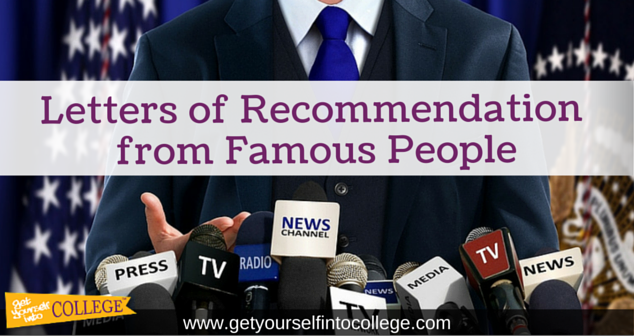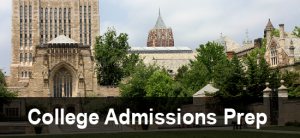Letters of recommendation play an important role in your college application package. They provide admissions officers with additional insight into your academic achievements and potential, habits of mind, and character.
You should plan to earn at least two letters of recommendation from teachers who’ve taught you academic subjects (e.g., math, English, history, science, or a foreign language) and one from your guidance counselor.
But what about recommendations from famous people like politicians?
Let’s consider the case of one of my students. We’ll call him Brandon.
Brandon spent his summer working on a high-powered political campaign. The experience was transformational. He learned about the challenges associated with getting people registered and motivated to vote, developed his own effective strategies for connecting with citizens, collaborated with the diverse group of individuals associated with the campaign, and was promoted to the position of assistant field organizer (a position he maintained once school started).
He wrote a great series of supplemental application essays about this experience, but he got really nervous about the admissions process and wanted to give himself as much of a competitive edge as possible.
His idea?
He wanted to get a recommendation from the politician.
The good news?
The politician told him to have his field organizer write the recommendation and then he’d sign off on it.
I could hear the excitement in Brandon’s voice when he was giving me the update.
The bad news?
He shouldn’t submit the recommendation from the politician. Brandon had very little direct interaction with him, and there were no references to working with him in the supplemental essays.
As such, the recommendation wouldn’t carry much weight. In fact, admissions officers might be turned off by the recommendation. It might seem as though Brandon was trying to pad his application.
My recommendation?
I encouraged Brandon to have his field organizer sign off on the recommendation she was going to write for him. He worked very closely with her right from the beginning, and she was so impressed by his work ethic, flexibility, listening and communication skills, and organizational capabilities that she promoted him. A recommendation from this less well-known individual would be more authentic and carry more weight than one from the famous person.
No college is going to admit you just because a famous person endorses you.
Does this mean that you should never include a letter of recommendation from a well-known person?
No.
If Brandon worked closely with the politician, I would have given him different advice.
Remember, the most important thing is to have authentic, detailed recommendation letters from people who truly know you in ways that matter to college admissions committees.
Don’t just take it from me.
Listen to the advice Stanford offers to undergraduates who need recommendations for “potential employers, scholarship and grant selection committees, [or] graduate school admissions offices”:
“Choose the people who know you best. Many students wonder whether to ask a `big name’ professor who knows only their face and final grade or a lesser-known professor who knows them better. Letters by famous people or well-known scholars only carry more weight if the famous person knows you well and can write a substantial, convincing recommendation. The more detailed, personalized a letter is, the more likely it is to make a strong impression on a selection committee. So ask your instructors with the most extensive, personal knowledge of you and your work.”
Want to learn how to earn excellent letters of recommendation? Click here to learn more about the online Get Yourself Into College program®.
Want to schedule a private consultation with me to discuss your recommendation strategy and any other admissions-related issues? Click here to set up your appointment.
Blog post image used: ©razihusin/bigstock.com



